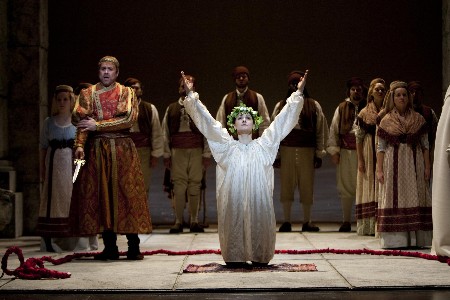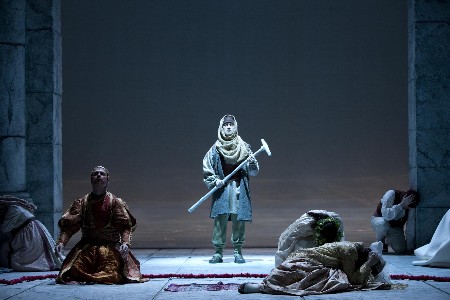Classical Music Review: ‘Idomeneo’
Mozart wrote some wonderful music in Idomeneo for his wind players, who were up to the task under the capable baton of David Angus.

The Greek prince Idamante (mezzo-soprano Sandra Piques Eddy) offers himself to be sacrificed by his father, Idomeneo (tenor Jason Collins), to pay off the king’s debt to Neptune and save the people of Crete. Photo: Charles Erickson
Reviewed By Caldwell Titcomb
Turning out an enormous amount of music in a host of genres during his short life (1756–91), Mozart felt that opera was his most important task. It was his view that the musical stage was the best way to leave a significant mark upon the world. So, having already written a dozen works for the stage, he was thrilled at the age of 24 to get a commission to compose Idomeneo for a Munich premiere in January of 1781.
We have numerous letters from Mozart to his father Leopold, who acted as a go-between for his son and the less than ideal librettist Giovanni Varesco. These letters are full of the composer’s concern for matters large and small, including the widely disparate abilities of his singers. In the end, he came up with his first great operatic masterpiece.
Thus, it is curious that Idomeneo took so long to catch on. There were only four performances during Mozart’s lifetime. Its British premiere did not take place until 1934 (in Glasgow). The first U.S. mounting was undertaken at Tanglewood on August, 4 1947 by Boris Goldovsky, who brought the production to Boston in December of that year. The Metropolitan Opera in New York finally got around to staging it in the fall of 1982.
The Boston Lyric Opera (BLO) has chosen the work to conclude its current season.
The story is a variant of the Greek myth in which Idomeneo, king of the Cretans at the siege of Troy, encountering a storm on the way home, vows to the god Neptune that he will sacrifice the first person he meets if he returns home safe. This proves to be his own son, Idamante. Trying to get around his oath, he finds that Neptune unleashes another storm and a sea-monster. A prisoner, Ilia, and the Greek princess Electra are both in love with Idamante. What we have, then, are four principal personages, all of whom are under enormous stress. The opera is prevailingly serious and tragic although it leads to a mainly happy ending.

Neptune (bass Craig Phillips), personified as a villager, interrupts the sacrifice of the prince Idamante. Photo: Charles Erickson
The BLO engaged a solid set of principals, who all sang admirably and on pitch and were evenly matched: soprano Camille Zamora as Ilia; soprano Caroline Worra as Electra; tenor Jason Collins as Idomeneo; and soprano Sandra Piques Eddy (who holds a master’s in voice from Boston University) as Idamante. Mozart did indeed write the role of Idamante as a trouser part for a soprano, though he later authorized its performance by a tenor.
The vocal quartet in Act 3, of which Mozart was inordinately proud, came off splendidly. Mozart provided an unusually large number of choruses for the townsfolk, and these were expertly sung by a group of 28 singers.
The tale took place in an area whose Corinthian columns had seen better days (John Conklin was the set designer). A large arch afforded a view of the sea beyond. At appropriate times the head of the god Neptune appeared accompanied by a trident, the symbol of his authority. Robert Wierzel’s lighting design was effective at times and bizarre at times.
The staging was in the hands of Lillian Groag (who is also an actress and playwright). Her work here was generally suitable. But she made one horrendous decision. Electra envisions a happy life with Idamante, only to learn in the end that he will reign with Ilia. Her hopes are dashed, and her jealousy drives her into an insane fury, upon which she storms off, perhaps to commit suicide. Here, however, Groag had Electra come back on stage and join in the final chorus of rejoicing. This made no more sense than if Malvolio at the end of Twelfth Night, having departed in a rage, decides to sneak back in.
Mozart wrote some wonderful music for his wind players, who were up to the task under the capable baton of David Angus. It was regrettable that the 40-person orchestra omitted the trio of noble trombones the composer called for in the oracle scene; but then the business manager likely figured he couldn’t afford to pay three people for a brief appearance.
The production continues through May 4.The BLO has also announced its repertory for next season. Puccini’s Tosca will be followed by The Emperor of Atlantis, composed in 1943 by Viktor Ullmann, who perished in a Nazi concentration camp. Handel’s Agrippina and Benjamin Britten’s A Midsummer Night’s Dream round out the offerings.



I loved this opera!. Despite the barely adequate voice of Collins and
his stilted posturing, he powerfully conveyed the dramtic dilemma of the king. The duets, trios, quartets choruses were marvelous. I didn’t find Elektra’s final appearance horrendous. It was obviously the beginning of the staged curtain call.
The costumes and set were incongruous (? Greek arch) but who cares?
Wonderful experience.
I believe the director’s intention was a play within a play: all the Cretan villagers were acting out the Idomeneo myth. At the end, the “performance” is over and the “villager” playing Elektra returns as herself to join with the others. This wasn’t made entirely clear.